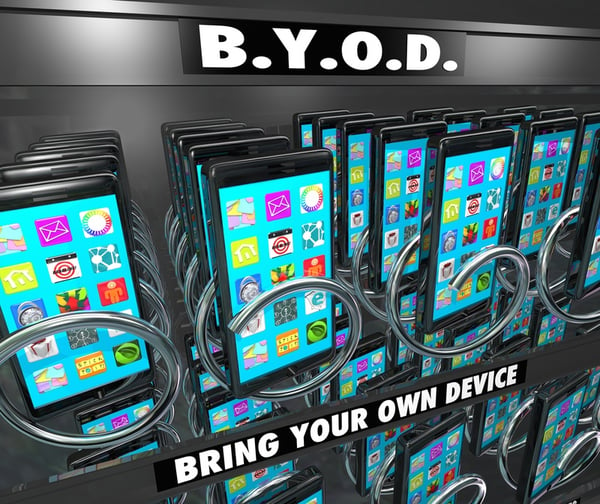
Bring-your-own-device (BYOD) policies seem to offer a simple proposition: let your employees use their own cell phones, laptops and tablets rather than requiring they use company-issued devices. However, this "simple" solution is more complicated than one might expect. To help companies navigate this concept, we have compiled a list of BYOD advantages and disadvantages.

The Advantages Of BYOD
1. Cost savings
When you think of BYOD, do you see dollar signs? Eliminating the cost of phones for an entire workforce can free up a lot of money. When the cost of data plans is also removed, as some businesses do, BYOD seems like a no brainer.
2. Morale
Another advantage is morale. Employees generally like using the devices they're familiar with. The touch pad works just as it should and the “control” key is right where it should be. All is well.
3. Productivity
Productivity may be improved. Being familiar with certain devices\OSes helps employees use them more effectively and efficiently. No time is wasted on navigating programs, folders or keys.
 The Disadvantages Of BYOD
The Disadvantages Of BYOD
1. Security
This is the biggest concern, and it’s anticipated to grow. Mobile malware, which disguises itself in advertisements and applications, poses a specific threat to BYOD devices. Companies will need to take extra actions to ensure devices are secure. This can include antivirus protection and data loss prevention, which may cause restrictions to the users' activities.
2. Exit Procedures
In addition, any business documents or data will need to be wiped from the employee’s equipment should they leave the company.
3. Support
Support issues are an extra concern. Support will be required for multiple devices and operating systems as employees bring a variety of devices.
Alternatives To BYOD
If you like the flexibility that BYOD affords, but don't like the potential risks, here are a few alternatives.
1. COPE
Corporate Owned/Personally Enabled: The employer buys the device and owns it, but the employee can treat it as their own and use it for personal issues. This lends extra control to the concept of BYOD. Unfortunately, it also introduces a lot of personal privacy issues that many employees may not be comfortable with.
2. CYOD
Choose Your Own Device: The employer creates a whitelist of allowed devices, only allowing BYOD for those devices. This can cut down on security problems, by only allowing devices you know are secure. Unfortunately, this may leave employees having to purchase new equipment if their devices do not make the cut.
What is best for your business?
Is BYOD a viable option? That depends on your individual business. Some issues can be mitigated with network solutions, such as robust access points, mobile device management and more. Curious about what action you need to take to prepare your network to accommodate a BYOD policy? Contact Hummingbird Networks!











